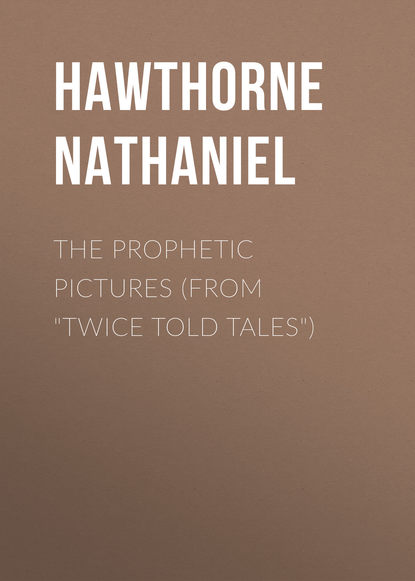 Полная версия
Полная версияПолная версия:
The Prophetic Pictures (From "Twice Told Tales")
“O glorious Art!” thus mused the enthusiastic painter, as he trod the street. “Thou art the image of the Creator’s own. The innumerable forms, that wander in nothingness, start into being at thy beck. The dead live again. Thou recallest them to their old scenes, and givest their gray shadows the lustre of a better life, at once earthly and immortal. Thou snatchest back the fleeting moments of History. With thee, there is no Past; for, at thy touch, all that is great becomes forever present; and illustrious men live through long ages, in the visible performance of the very deeds which made thorn what they are. O potent Art! as thou bringest the faintly revealed Past to stand in that narrow strip of sunlight, which we call Now, canst thou summon the shrouded Future to meet her there? Have I not achieved it? Am I not thy Prophet?”
Thus, with a proud, yet melancholy fervor, did he almost cry aloud, as he passed through the toilsome street, among people that knew not of his reveries, nor could understand nor care for them. It is not good for man to cherish a solitary ambition. Unless there be those around him, by whose example be may regulate himself, his thoughts, desires, and hopes will become extravagant, and he the semblance, perhaps the reality, of a madman. Reading other bosoms, with an acuteness almost preternatural, the painter failed to see the disorder of his own.
“And this should be the house,” said he, looking up and down the front, before he knocked. “Heaven help my brains! That picture! Methinks it will never vanish. Whether I look at the windows or the door, there it is framed within them, painted strongly, and glowing in the richest tints – the faces of the portraits – the figures and action of the sketch!”
He knocked.
“The Portraits! Are they within?” inquired he, of the domestic; then recollecting himself, – “your master and mistress! Are they at home?”
“They are, sir,” said the servant, adding, as he noticed that picturesque aspect of which the painter could never divest himself, “and the Portraits too!”
The guest was admitted into a parlor, communicating by a central door with an interior room of the same size. As the first apartment was empty, he passed to the entrance of the second, within which his eyes were greeted by those living personages, as well as their pictured representatives, who had long been the objects of so singular an interest. He involuntarily paused on the threshold.
They had not perceived his approach. Walter and Elinor were standing before the portraits, whence the former had just flung back the rich and voluminous folds of the silken curtain, holding its golden tassel with one hand, while the other grasped that of his bride. The pictures, concealed for months, gleamed forth again in undiminished splendor, appearing to throw a sombre light across the room, rather than to be disclosed by a borrowed radiance. That of Elinor had been almost prophetic. A pensiveness, and next a gentle sorrow, had successively dwelt upon her countenance, deepening, with the lapse of time, into a quiet anguish. A mixture of affright would now have made it the very expression of the portrait. Walter’s face was moody and dull, or animated only by fitful flashes, which left a heavier darkness for their momentary illumination. He looked from Elinor to her portrait, and thence to his own, in the contemplation of which he finally stood absorbed.
The painter seemed to hear the step of Destiny approaching behind him, on its progress towards its victims. A strange thought darted into his mind. Was not his own the form in which that destiny had embodied itself, and he a chief agent of the coming evil which he had foreshadowed?
Still, Walter remained silent before the picture, communing with it, as with his own heart, and abandoning himself to the spell of evil influence, that the painter had cast upon the features. Gradually his eyes kindled; while as Elinor watched the increasing wildness of his face, her own assumed a look of terror; and when at last he turned upon her, the resemblance of both to their portraits was complete.
“Our fate is upon us!” howled Walter. – “Die!”
Drawing a knife, he sustained her, as she was sinking to the ground, and aimed it at her bosom. In the action and in the look and attitude of each, the painter beheld the figures of his sketch. The picture, with all its tremendous coloring, was finished.
“Hold, madman!” cried he, sternly.
He had advanced from the door, and interposed himself between the wretched beings, with the same sense of power to regulate their destiny, as to alter a scene upon the canvas. He stood like a magician, controlling the phantoms which he had evoked.
“What!” muttered Walter Ludlow, as he relapsed from fierce excitement into silent gloom. “Does Fate impede its own decree?”
“Wretched lady!” said the painter. “Did I not warn you?”
“You did,” replied Elinor, calmly, as her terror gave place to the quiet grief which it had disturbed. “But – I loved him!”
Is there not a deep moral in the tale? Could the result of one, or all our deeds, be shadowed forth and set before us, some would call it Fate, and hurry onward, others be swept along by their passionate desires, and none be turned aside by the PROPHETIC PICTURES.



